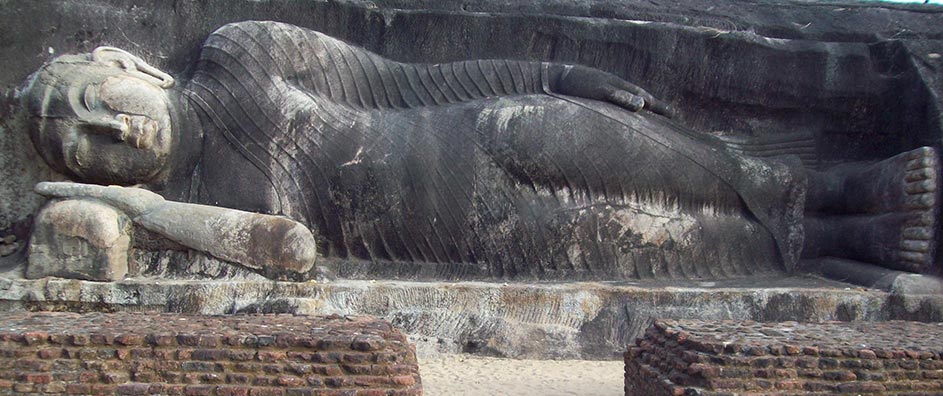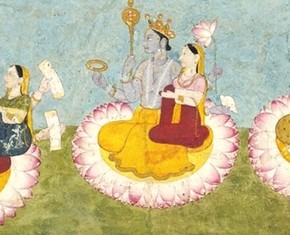The views expressed in our content reflect individual perspectives and do not represent the authoritative views of the Baha'i Faith.
As Buddha explained: “religious life does not depend on the dogma.” For Buddhists, dogma “profits not, nor has to do with the fundamentals of religion, nor tends to aversion, absence of passion, cessation, quiescence, the supernatural faculties, supreme wisdom, and Nirvana; therefore have I not explained it.” In short, the essence of religion, as Baha’is believe, is about the refinement of human character, the alignment of our selves with divine reality (nirvana) and civilization building. To make it about arcane distinctions, is not productive.
But while the Buddha does not dwell on theology, he does clearly proclaim:
There is an Unborn, an Unoriginated, an Unmade, an Uncompounded; were there not, O mendicants, there would be no escape from the world of the born, the originated, the made, and the compounded. – Udana 8:3 In The Spiritual Heritage of India Swami Prabhavananda , p. 181.
That Unborn source of salvation clearly bears a striking resemblance to God as the more westernized world Faiths understand the Creator. But rather than trying to talk about this God in a land of too many gods, the Buddha’s elegant solution simply involved talking about what is: the human condition, suffering and the way toward salvation. It is a mistake, however, to think that the Buddha does not know God. He had special knowledge of God, proclaiming to His disciple Vasettha:
For Brahman I know, Vasettha, and the world of Brahman, and the path that leadeth unto it. Yea I know it even as one who has entered the Brahman world, and has been born within it. – Svetasvatara 3:9 In The Spiritual Heritage of India Swami Prabhavananda, p. 173.
It is important to note that while we talk about God all the time in the West, God is, as Aquinas reminds us in his De Potentia, unknowable as He “surpasses all that we can understand of him.” We talk of God because we feel connected to God’s Being, to the ultimate source of Reality, and this is what the Buddhists call nirvana.
It is true that most forms of Buddhism speak little of a creator God. But creation stories actually fill very little of Western scripture. What really fills our scripture are our attempts to describe our attraction for the Being that is and to which we are connected, our wonder for the world, and what leads to personal and social advancement or abasement. These are the same pursuits of Buddhist scripture. At heart Eastern and Western religion have the same goal and are occupied with the same tasks. The Dalai Lama makes this point very well:
For a non-Buddhist, the idea of nirvana and a next life seems nonsensical. Similarly, to Buddhists, the idea of a Creator God sometimes sounds like nonsense. But these things don’t matter; we can drop them. The point is that through these different traditions, a very negative person can be transformed into a good person. That is the purpose of religion — and that is the actual result. – The Four Noble Truths, p. 5.
To say that Buddhism is atheistic misses the point entirely. The Buddha frequently spoke of Brahman (God) with intimate knowledge, and as we’ve seen he condemned those priests who did not act in conformity with Brahman’s nature. Further, the whole mission of Buddhism is to help alleviate human suffering by preaching moral behavior and alignment with the sacred stuff of reality (God).
Baha’is believe that this profound and holy way of seeing the universe and our place in it puts Buddhism in the pantheon of the world’s great Faiths. To Baha’is these eternal truths, whether expressed by Buddha or Christ or Baha’u’llah, all come from the same source:
No one truth can contradict another truth. Light is good in whatsoever lamp it is burning! A rose is beautiful in whatsoever garden it may bloom! A star has the same radiance if it shines from the East or from the West. Be free from prejudice, so will you love the Sun of Truth from whatsoever point in the horizon it may arise! You will realize that if the Divine light of truth shone in Jesus Christ it also shone in Moses and in Buddha. – Abdu’l-Baha, Paris Talks, p. 137.
You May Also Like
Comments



















The name Brahmān originates in the historical Vedic religion, in which Brahmān appears as the creator of the universe. Early Buddhist texts describe several different Brahmāns coexisting in the same universe; some of them think they are "all powerful" creators of the world, but they are corrected by the Buddha. The myths, characters, and functions of these Brahmāns are distinct from those of the Vedic Brahmā. However, at least one of the Buddhist Brahmāns is identified as being ...the object of worship of pre-Buddhist brahmins. The Buddha described the Vedic Brahmān as a misunderstanding, or mistaken remembrance, of one or more of the Buddhist Brahmās, as explained in the Brahmajāla sutta (Digha Nikaya 1).
There is no identity between the Buddhist Brahmāns and the Hindu conception of brahman as an all-encompassing divine force.
There are at least four ways of interpreting the term Brahmān. It may refer to:
Any of the deities of the Ārūpyadhātu or of the Rūpadhātu
Any of the deities of the nine lowest worlds of the Rūpadhātu, from Śubhakṛtsna to Brahmapāriṣadya.
Any of the deities of the three lowest worlds of the Rūpadhātu
A Mahābrahmā, one of the highest deities of preceding group.
In the sense of "a being of the Rūpadhātu", the term Brahmā may be related to Brahmavihāra, a term referring to the meditative states achieved through the four Rūpajhānas, which are shared by the inhabitants of the Rūpadhātu.
The old Upanishads largely consider Brahman in the masculine gender (Brahmā in the nominative case, henceforth "Brahmā") to be a personal god, and Brahman in the neuter gender (Brahma in the nominative case, henceforth "Brahman") to be the impersonal world principle. They do not strictly distinguish between the two, however. The old Upanishads ascribe these characteristics to Brahmā: first, he has light and luster as his marks; second, he is invisible; third, he is unknowable, and it is impossible to know his nature; fourth, he is omniscient. The old Upanishads ascribe these characteristics to Brahman as well. In the Buddhist texts, there are many Brahmās. There they form a class of superhuman beings, and rebirth into the realm of Brahmās is possible by pursuing Buddhist practices. In the early texts, the Buddha gives arguments to refute the existence of a creator.
In the Pāli scriptures, the neuter Brahman does not appear (though the word brahma is standardly used in compound words to mean "best", or "supreme"), however ideas are mentioned as held by various Brahmins in connection with Brahmā that match exactly with the concept of Brahman in the Upanishads. Brahmins who appear in the Tevijja-suttanta of the Digha Nikaya regard "union with Brahmā" as liberation, and earnestly seek it. In that text, Brahmins of the time are reported to assert: "Truly every Brahmin versed in the three Vedas has said thus: 'We shall expound the path for the sake of union with that which we do not know and do not see. This is the correct path. This path is the truth, and leads to liberation. If one practices it, he shall be able to enter into association with Brahmā." The early Upanishads frequently expound "association with Brahmā", and "that which we do not know and do not see" matches exactly with the early Upanishadic Brahman.
In the earliest Upanishad, the Brihadaranyaka Upanishad, the Absolute, which came to be referred to as Brahman, is referred to as "the imperishable". The Pāli scriptures present a "pernicious view" that is set up as an absolute principle corresponding to Brahman: "O Bhikkhus! At that time Baka, the Brahmā, produced the following pernicious view: 'It is permanent. It is eternal. It is always existent. It is independent existence. It has the dharma of non-perishing. Truly it is not born, does not become old, does not die, does not disappear, and is not born again. Furthermore, no liberation superior to it exists elsewhere." The principle expounded here corresponds to the concept of Brahman laid out in the Upanishads. According to this text the Buddha criticized this notion: "Truly the Baka Brahmā is covered with unwisdom."
The Buddha confined himself to what is empirically given. This empiricism is based broadly on both ordinary sense experience and extrasensory perception enabled by high degrees of mental concentration. (However it should be noted that amongst the customary epithets of the Buddha are the Pali terms 'lokuttara', meaning 'world-transcending', and also 'lokavidu', meaning 'knower of worlds' which are both quite incompatible with the notion of 'empiricism' as generally understood in current philosophy.)